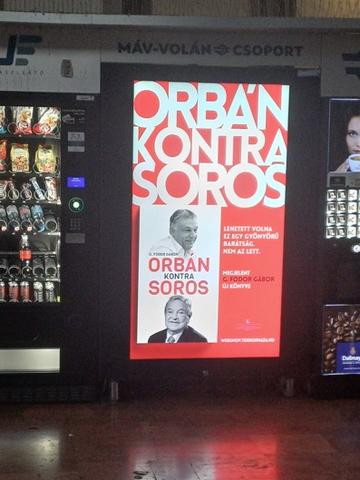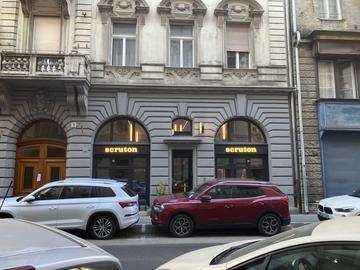'Cosy Cafés and Culture Wars: Orbanism and Academia in Budapest'

Professor David Priestland (Professor of Modern History, St Edmund Hall)
On arriving at Budapest airport, the traveller is confronted by the greeting ‘Welcome to Family-Friendly Hungary’ in multiple languages. And while this salutation is not quite as ubiquitous and intrusive as the slogans that met the visitor to parts of the communist world before 1991, it did suggest to me that I was behind a new iron curtain, in another ideological world – one dominated by Prime Minister Victor Orbán and the principles of his so-called ‘System of National Cooperation’ - ‘Family, Nation, God’. For since the beginning of his second premiership in 2010, Hungary has become one of the most active global proselytisers of what might be called ‘National Conservatism’, a movement whose power is growing throughout the world and is being boosted even further by the new Trump administration.
I was in Budapest last November to give a talk at an academic workshop on challenges to liberalism in Europe from a historical perspective, examining the legacies of the interwar era, and comparing past with present. The meeting itself could not have been more symbolically located, taking place in one of the principal centres of these ideological struggles - the now partially-abandoned building of the Central European University (CEU) in the centre of the city. Established by the Hungarian-American financier and philanthropist George Soros, the CEU came under attack from 2015 when Soros-funded NGOs helping Syrian asylum seekers became the target of the Orbán government’s anti-migrant rhetoric. In 2017 the government passed a law which effectively forced the university to move its teaching from Hungary to Vienna. A number of the CEU’s research institutes, however, stayed in Budapest and remain active and vibrant: its Institute for Advanced Study and Open Society Archive are based there, as is the Democracy Institute which was hosting our workshop under the auspices of Balázs Trencsényi, a leading intellectual historian of Central Eastern Europe. Yet the government continues to put pressure on the CEU, and Hungarian academia more generally. At the workshop itself papers were presented on, among other things, the Orbán regime’s use of history to promote nationalist agendas, while demonstrators protested in the street outside – though it turned out their ire was not directed at us but at another conference on same-sex marriage that was taking place in the building.
Of course, Viktor Orbán’s government is only one of a number of right-wing nationalist regimes in power today which ground their appeal in ‘populist’ messages, claiming that a supposedly unified ‘people’ is suffering at the hands of an immoral ‘elite’ - in Hungary’s case Brussels ‘imperial bureaucrats’, international financiers (like Soros) and cosmopolitan liberals who, it is claimed, favour Muslim migrants over Hungarians, and unorthodox lifestyles over Christian family values. Like other ‘illiberal democracies’, such as Erdogan’s Turkey or Modi’s India, it has sought to exert control over the media, the courts and the universities. Also like these other regimes, it uneasily combines nationalist agendas with the promotion of ultra-pro-market, neoliberal policies - the relationship between these two apparently contradictory policy programmes is one of the themes of my research. In 2010 Orbán was propelled to power for the second time by the global financial crisis which affected Hungary particularly badly, and he broke with neoliberal orthodoxies by taxing foreign banks and large transnational companies, as well as giving subsidies to Hungarian families to have more children. Even so, he continues with policies such as eroding workers’ rights and reducing taxes for the wealthy.

Yet, as I noticed at Budapest airport, one unusual feature of the Orbán regime is its particular commitment to promoting its ideology globally – indeed it has arguably been more successful than Putin’s governmentin its National Conservative propaganda. The Hungarian state has invested heavily in a series of academic institutions, think tanks and individuals, and British intellectuals have been strikingly central to this project: John O’Sullivan, a former Thatcher speech-writer, runs a conservative think-tank, the Danube Institute; the late Norman Stone, former Professor of Modern History in Oxford, lived in Budapest for some time as a guest of a pro-Orbán foundation; and the conservative academic Roger Scruton became a strong supporter of Orbanism and since his death in 2020 has been canonised by the regime. Six ‘Scruton Cafés’ have opened in Budapest, where customers can enjoy Hungarian potato dumplings surrounded by Scruton’s own library (donated by his widow), several busts and other Scrutonalia; tote bags and candles proclaiming ‘oikophilia’ (‘love of home’ – one of Scruton’s key concepts) and ‘intelligence is sexy’ (not attributed to the late philosopher) are also available for purchase.
Yet while the Scruton Cafés project an image of cosy and homely localism, Orbán’s ambitions reach far beyond Hungary. His think-tanks have become important hubs for the French, German and Italian far right - links with Meloni’s government are particularly strong - and he has established close relations with Putin’s Russia. Particularly consequential for global politics, though, have been Orbanist links with the National Conservative wing of the MAGA movement. Tucker Carlson and Rod Dreher, the conservative journalist and friend of Vice-President J.D. Vance, have visited Orbán’s institutes. Meanwhile Kevin Roberts, the President of the Heritage Foundation, whose radical conservative ‘Project 2025’ has supporters within the Trump administration, has been awarded the Officer’s Cross of the Order of Merit of Hungary, Civilian Division. Indeed Trump himself hosted Orbán at Mar-a-Lago in March 2024 and declared ‘There’s nobody that’s better, smarter or a better leader than Viktor Orbán. He’s fantastic’.
Speaking in 2019, Orbán declared that ‘In 1989, we thought Europe was our future. Today, we know that we are the future of Europe’. Support for Orbán within Hungary itself is waning, but with the recent electoral successes of the far right throughout much of Europe - from France to Slovakia, from Italy to Romania - that prediction no longer seems so far-fetched.



